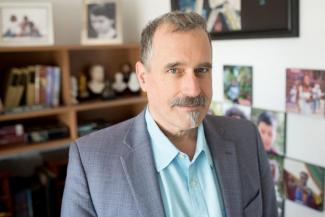
Prof. Alan Bovik has been elected to the Academia Europaea for 2023 for his contributions to video engineering. The object of Academia Europaea is the advancement and propagation of excellence in scholarship in the humanities, law, the economic, social, and political sciences, mathematics, medicine, and all branches of natural and technological sciences anywhere in the world for the public benefit and for the advancement of the education of the public of all ages. The aim of the Academy is to promote European research, advise governments and international organisations in scientific matters, and further interdisciplinary and international research.
The Academy was founded in 1988, with over 4500 members which includes leading experts from the physical sciences and technology, biological sciences and medicine, mathematics, the letters and humanities, social and cognitive sciences, economics and the law.
Prof. Bovik holds the Cockrell Family Endowed Regents Chair in Engineering in the Chandra Family Department of Electrical and Computer Engineering in the Cockrell School of Engineering at The University of Texas at Austin, where he is Director of the Laboratory for Image and Video Engineering (LIVE). He is a faculty member in the Department of Electrical and Computer Engineering, the Wireless Networking and Communication Group (WNCG), and the Institute for Neuroscience. His research interests include digital television, digital photography, visual perception, social media, and image and video processing.
Dr. Bovik has received a number of major international awards. These include:
- In 2022, Prof. Bovik was elected to the prestigious National Academy of Engineering "for contributions to the development of tools for image and video quality assessment." He was also elected as a Fellow of the National Academy of Inventors.
- A 2022 BaM ("Bammy") Award® from the International Trade Association for Broadcast and Media (IABM) for "perceptual picture and video quality algorithms for streaming and social media."
- The 2022 IEEE Edison Medal "for pioneering high-impact scientific and engineering contributions leading to the perceptually optimized global streaming and sharing of visual media.” The Edison Medal is given "for a career of meritorious achievement in electrical science, electrical engineering, or the electrical arts." It is the oldest and most prestigious medal in this field of engineering, having been presented since 1909.
- A Technology and Engineering Emmy® Award from the National Academy of Television Arts and Sciences in 2021 for the "development of perceptual metrics for video encoding optimization." This award, which is Television’s highest honor, is only bestowed upon an individual, company or organization for developments in engineering that are either “so extensive an improvement on existing methods, or so innovative in nature, that they materially affect the transmission, recording or reception of television.”
- The Progress Medal from the Royal Photographic Society (RPS) in 2019 "in recognition of any invention, research, publication or other contribution which has resulted in an important advance in the scientific or technological development of photography or imaging in the widest sense." The Progress Medal is the oldest and most prestigious honor in the field of photography, having been given annually since 1878. Professor Bovik was also named Honorary Fellow of RPS (HonFRPS).
- The IEEE Fourier Award for Signal Processing in 2019 “For seminal contributions and high-impact innovations to the theory and application of perception-based image and video processing.” This Technical Field Award and medal is one of the highest honors accorded by the 423,000-member IEEE.
- The Edwin H. Land Medal from The Optical Society of America in 2017 “For substantially shaping the direction and advancement of modern perceptual image quality theory, and for energetically engaging industry to transform his ideas into global practice.”
- A Primetime Emmy® Award for Outstanding Achievement in Engineering Development from the Academy of Television Arts and Sciences (The Television Academy) in October 2015, for his work on the development of video quality prediction models which have become standard tools in broadcast and post-production houses throughout the television industry. This award, which is Television’s highest honor, is only bestowed upon an individual, company or organization for developments in engineering that are either “so extensive an improvement on existing methods, or so innovative in nature, that they materially affect the transmission, recording or reception of television.”
